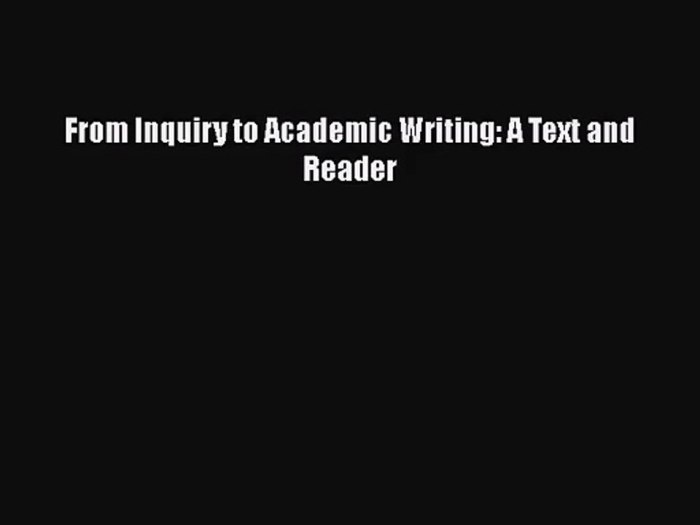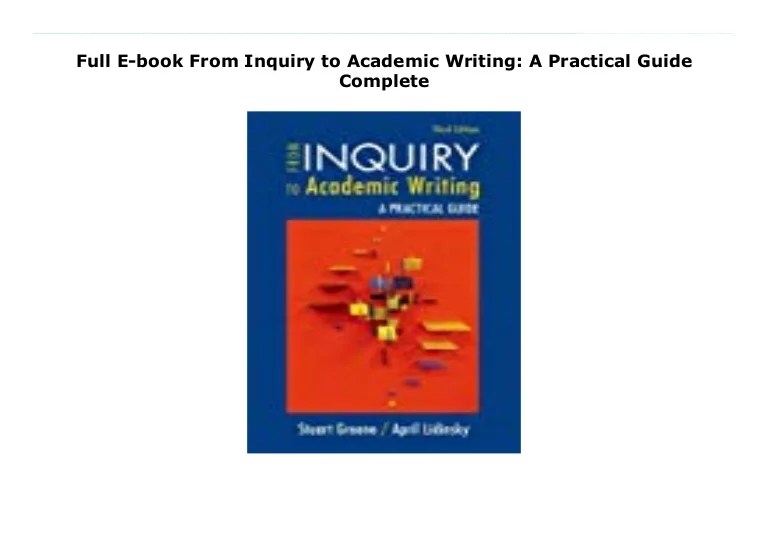From inquiry to academic writing a practical guide 5th edition – From Inquiry to Academic Writing: A Practical Guide, 5th Edition is an indispensable resource for students and researchers seeking to master the art of academic writing. This comprehensive guide provides a step-by-step approach to the academic writing process, from developing research questions to effectively communicating your findings.
The book’s clear and concise explanations, coupled with practical exercises and examples, empower readers to develop their critical thinking skills, refine their writing style, and adhere to academic conventions. Whether you are a novice writer or an experienced researcher, this guide will equip you with the knowledge and tools necessary to produce high-quality academic work.
Introduction

This book is a comprehensive guide to the academic writing process, from inquiry and research to writing and editing. It is designed for students and researchers at all levels who want to improve their academic writing skills.
Inquiry and Research
Developing Research Questions
The first step in the academic writing process is to develop a research question. A good research question is focused, specific, and feasible. It should be something that you are interested in and that you have the resources to research.
Conducting Effective Research
Once you have developed a research question, you need to conduct effective research. This involves finding and evaluating sources of information. You should use a variety of sources, including books, articles, websites, and databases.
Critical Thinking in Research
As you conduct your research, it is important to think critically about the information you find. This means evaluating the credibility of the sources, identifying biases, and drawing your own conclusions.
Academic Writing Process
Stages of the Academic Writing Process, From inquiry to academic writing a practical guide 5th edition
The academic writing process typically involves four stages: planning, drafting, revising, and editing. In the planning stage, you develop your research question and Artikel your paper. In the drafting stage, you write a first draft of your paper. In the revising stage, you make changes to your paper to improve its structure, clarity, and flow.
In the editing stage, you check your paper for errors in grammar, punctuation, and spelling.
Organizing and Structuring Academic Writing
Academic writing should be organized and structured in a logical way. This means using headings and subheadings to divide your paper into sections and using transitions to connect your ideas.
Writing Effectively in Different Academic Styles
There are different academic writing styles, depending on the discipline. It is important to be familiar with the style that is expected in your field.
Writing Conventions and Style: From Inquiry To Academic Writing A Practical Guide 5th Edition

Importance of Following Academic Writing Conventions
It is important to follow academic writing conventions in order to ensure that your paper is clear, concise, and professional. These conventions include using correct grammar, punctuation, and spelling, as well as citing your sources correctly.
Elements of Academic Style
Academic style is characterized by the use of formal language, precise terminology, and objective tone. It is also important to avoid plagiarism and to give credit to the work of others.
Examples of Correct and Incorrect Academic Writing
Here are some examples of correct and incorrect academic writing:
- Correct:The research question was developed based on a review of the literature.
- Incorrect:The research question was developed because I thought it was interesting.
- Correct:The author argues that the use of social media can have a negative impact on mental health.
- Incorrect:The author thinks that social media is bad for you.
Critical Reading and Analysis
Critically Reading Academic Texts
It is important to be able to critically read academic texts in order to understand the arguments that they make and to evaluate their validity.
Analyzing Academic Arguments
When analyzing academic arguments, it is important to identify the main points, the evidence that is used to support those points, and the conclusions that are drawn.
Synthesizing Information from Multiple Sources
When writing an academic paper, it is often necessary to synthesize information from multiple sources. This means combining information from different sources into a coherent and cohesive argument.
Revising and Editing
Tips for Revising and Editing Academic Writing
Once you have written a first draft of your paper, it is important to revise and edit it carefully. This involves making changes to improve the structure, clarity, and flow of your paper, as well as checking for errors in grammar, punctuation, and spelling.
Getting Feedback on Academic Writing
It can be helpful to get feedback on your academic writing from a peer or a teacher. This feedback can help you to identify areas that need improvement.
Importance of Proofreading Before Submitting Academic Writing
Before submitting your academic writing, it is important to proofread it carefully for errors in grammar, punctuation, and spelling.
Research Ethics

Ethical Considerations in Academic Research
It is important to be aware of the ethical considerations involved in academic research. These considerations include avoiding plagiarism, obtaining informed consent from participants, and protecting the privacy of participants.
Importance of Avoiding Plagiarism and Academic Dishonesty
Plagiarism is the act of using someone else’s work without giving them credit. It is a serious academic offense that can result in severe penalties.
Guidelines for Ethical Research Practices
There are a number of guidelines that you can follow to ensure that your research is conducted ethically. These guidelines include:
- Obtaining informed consent from participants
- Protecting the privacy of participants
- Avoiding plagiarism
- Citing your sources correctly
FAQ Resource
What is the purpose of From Inquiry to Academic Writing?
From Inquiry to Academic Writing is designed to provide a comprehensive guide to the academic writing process, from developing research questions to effectively communicating your findings.
Who is the target audience for this book?
This book is primarily intended for students and researchers seeking to improve their academic writing skills. However, it can also benefit professionals and anyone engaged in writing for academic purposes.
What are the key features of the 5th edition?
The 5th edition includes updated content and exercises, as well as new sections on critical reading, analysis, and research ethics.